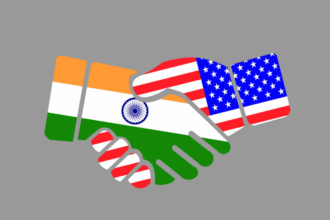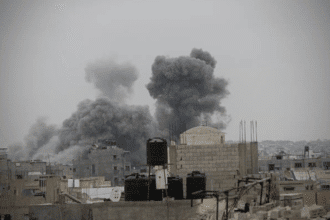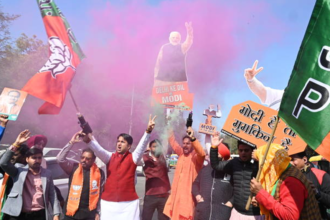Following a conflict-filled ceasefire agreement with Israel, the Iranian Supreme Leader sent a direct message to the US: The US was not winning anything with those strikes. The remark was issued as he made his first official outing after a row of US laser bombardments on Iran’s nuclear installations. His remarks made the American operation an ineffective one, whereas the Iranian leaders claimed that the retaliation was justified and successful in its effect.
- Why were the US Strikes on Iran?
- What was the Iranian Response to the US Operation?
- Is US Intelligence Coming Under Fire?
- What is the International reaction to this escalation?
- What Does This Fit into with the Regional Conflict?
- What are the Dangers of a Further Military Build-Up?
- Where Does Iran Stand in its Post-Ceasefire?
- Final Thoughts
The airstrikes were said by the US officials to have seriously damaged the Iranian nuclear capabilities, but this was strongly denied by the Iranian leadership, who made it out as futile, le and in case of future aggression, they would face the consequences.
Why were the US Strikes on Iran?
The United States attacked three major Iranian nuclear facilities these were the Fordo, Natanz, and Isfahan facilities, under the argument that the operation was supposed to do away with the swift acquisition of nuclear weapons. According to the American intelligence agencies, the operation was the one that put the nuclear program years behind. The US Defense Secretary stated that the facilities had been turned into non-functional states with large-scale structural damage caused by the precision bunker buster bombs.
But in spite of these adventurous remarks, Iran defied them. According to the Supreme Leader, strikes did not give the US anything, and the nuclear program was intact and functional. It is also this direct contradiction that formed a smoke of narrative war between the two nations. Here is the link to our article on the Trump-Iran Ceasefire
What was the Iranian Response to the US Operation?
Iran responded by attacking a US military base in Qatar using missiles. There were no casualties,, but the attack had a powerful message. Iran said i had received a tough blow and such counteractions were also possible in the future. Iranian authorities said the retaliation proved they could strike back not only symbolically but with a perfect strategic ability.
Moreover, Iran enacted a parliamentary bill to terminate its collaboration with the International Atomic Energy Agency (IAEA) to deny entry of inspectors into the Iranian nuclear plants. This is an act that heightened questions in the world regarding the lack of transparency and the reality on nuclear ambitions of Iran.
Such a brave statement that strikes did not benefit the US was followed by the gestures of Iran and its rhetoric within the country, which indicated that Iran is unwilling to be threatened or blackmailed.
Is US Intelligence Coming Under Fire?
Yes. Although the attack was loudly proclaimed as a significant military victory by US authorities, the various contradictions and denials by the Iranians have cast it in doubt. It was reported that some of the American authorities did not have a clear idea of the real damage. The questions also lingered on whether enriched uranium had been removed already to Forbefore to the strike, of which the US claimed ignorance.
The Supreme Leader of Iran mocked such utterances rebuking the US as exaggerating. The strikes did not interfere with core activities, according to him, and he termed the American claims to be propaganda aimed at the domestic and international audience. Even his publicly announced rejection – the US gained nothing out of strikes- was as much an issue of influence as it was an issue of facts. Here is the link to our article on Iran Nuclear Strikes
What is the International reaction to this escalation?
The international circles have become concerned. Although there is some sort of truce between Israel and Iran, there are myriad of people who believe that this ceasefire is transitory. The threat posed the Iranian aggression and the move to deny the IAEA the sites has resulted in alarm by international stakeholders. In the meantime, Washington is said to be considering options of re-engaging Iran through diplomatic means,, where it is offering to support a civilian nuclear program.
Nonetheless, in an obvious reply, the foreign minister of Iran stated that there are no intentions to hold negotiations with the US. The stand hostilities are still running out, and Iran is rejoicing over what it terms as a strategic victory. The US lost nothing by strikes is a phrase being touted by different Iranian officials, and it is becoming a pin point of rally in that country.
What Does This Fit into with the Regional Conflict?
This fight was part of a general Israeli-Iranian conflict, which started on June 13. Military actions of the country increased at a high rate following warnings by Israel regarding the nuclear capabilities of Iran. Iran lost more than 600 lives of civilians as a result of 12 days of air strikes, compared with 28 people killed in Israel.
What made matters even worse is the US involvement. It first acted as a mediator, only to intervene directly with the strikes. The communication has since been turned into a warzone of sorts as the two countries propagate contradicting narratives.
In all these, the slogan US gained nothing by strikes has stood out as a counter-story to the claims being made by Washington and added to the wider resistance narrative being peddled by Tehran.
What are the Dangers of a Further Military Build-Up?
To avoid further strikes, Iran has been categorical that a forceful response to any future strike will be employed. During the speech, Ayatollah Khamenei threatened that a subsequent attack would cost the US even more. This, too, he said, can be repeated in the future, the Qatar base strike.
Even though the US denied the damage and underrated the threat, there are indications that Iran is gearing up for an ongoing confrontation. The truce can just lead to a hiatus, more so when there is no prospect of diplomacy being launched and having real results.
Where Does Iran Stand in its Post-Ceasefire?
Iran is manipulating itself as the champion. Although its facilities have been damaged physically, its leadership is making claims that the US has accomplished nothing using strikes, the nuclear program is still going on. The messages in terms of the public framing are explicit, i.e., it was inefficient when the strikes were carried out, the response was strong, and Iran will not give up.
A rejection of negotiation and withdrawal of cooperation with the IAEA highlight a confrontational attitude in the country. Tehran wants to establish the rule in terms of the possible future interaction, and the strikes and the spin-offs after them are evidence of the power and strength.
Final Thoughts
The claim that the US gained nothing from strikes is more than rhetoric—it’s a narrative Iran has used to shape global perception. Even if the military damage was substantial, Iran’s leadership ensured that politically, it appeared unshaken. This control of the story matters both at home and internationally. With diplomacy absent and mistrust peaking, the Middle East stands on uncertain ground. True peace will only emerge when talks replace missiles. For now, the idea that the US gained nothing from strikes may well define the next chapter of this ongoing crisis.








